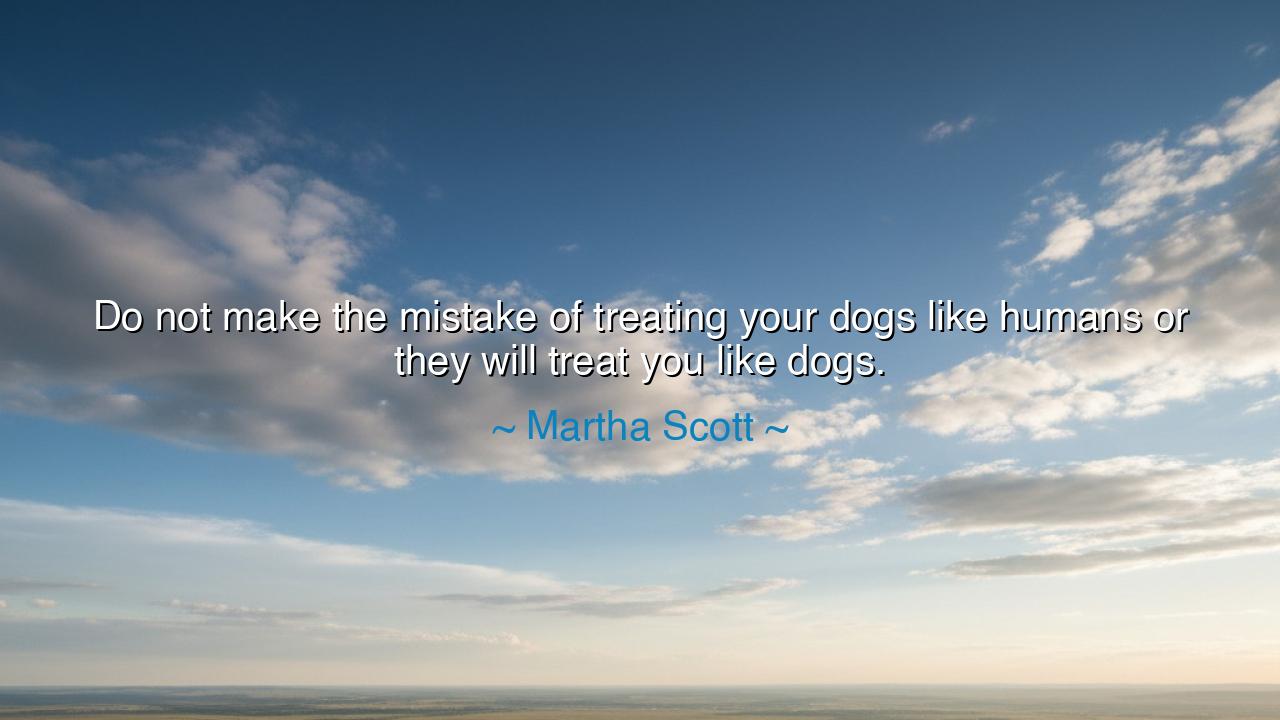
Do not make the mistake of treating your dogs like humans or
Do not make the mistake of treating your dogs like humans or they will treat you like dogs.






Hear the warning voice of Martha Scott, who declared: “Do not make the mistake of treating your dogs like humans or they will treat you like dogs.” At first, these words may sound like jest, a playful saying about the ways of pets. Yet beneath them lies an ancient truth about order, discipline, and the natural balance of relationships. For every bond—whether between man and beast, ruler and people, parent and child—rests upon understanding the roles given, and when those roles are confused, harmony collapses into chaos.
The dog is noble among creatures, loyal in heart, and steadfast in service. Yet it is not a human, and when treated as such, it forgets its place. The master who abandons discipline and order, who indulges the animal as though it were sovereign, finds himself no longer the guide but the servant. Thus the proverb speaks: if you treat your dog as a man, it will see you as no master, but as a beast equal or beneath itself. The home then shifts, and the order of loyalty becomes disorder of dominion.
The ancients saw this truth not only in beasts but in society. The philosopher Aristotle taught that every household and city must be ordered rightly, with each role honored in its place. When the ruler became the servant of whims, or the servant took the place of master, ruin followed swiftly. The saying of Martha Scott is but this wisdom wrapped in the image of the dog: that indulgence without boundary breeds rebellion, and kindness without firmness breeds folly.
History offers us many examples. Consider the story of the Roman emperor Caligula, who in his madness elevated his horse to the rank of consul. Though done in arrogance and absurdity, the act symbolized a deeper truth: when the lines between man and beast, master and subject, ruler and ruled are blurred, respect dissolves, and authority collapses into mockery. So too with the indulgent master and his dog—in striving to honor the animal as man, he risks being made the animal himself.
Yet this saying is not cruelty, but wisdom. For to treat the dog as dog is not to demean it, but to honor its nature. The dog thrives not when it rules, but when it serves, guided by a master’s steady hand. Likewise, the human thrives not by abdicating responsibility, but by leading with strength tempered by affection. Discipline, love, and respect are the triad that keep harmony between man and beast. Remove one, and the balance is broken.
The teaching also touches upon human relationships. For do we not see, in families and in nations, the same danger? When a leader seeks only to please, he is devoured by those he should guide. When a parent indulges every whim, the child soon rules the house. When discipline is cast aside for flattery, order is overturned, and chaos reigns. The dog in the proverb is but a mirror of human truth: authority without boundaries becomes slavery.
Thus the lesson is clear: love those entrusted to your care, but do not abandon your role. Treat your dogs with kindness, but also with firmness, so that they may flourish in loyalty. Treat your children with compassion, but also with discipline, so that they may grow in wisdom. Treat your people with justice, but also with strength, so that they may live in order. To confuse these truths is to invite rebellion, disorder, and mockery.
So let your action be this: honor the roles given in life. Be firm where you must lead, be gentle where you must care, and be wise enough to distinguish the difference. For if you blur the line between dog and human, you lose not only respect, but harmony. As Martha Scott teaches, in this balance lies the path of peace: to love rightly, to guide firmly, and to honor each being according to its true nature.






AAdministratorAdministrator
Welcome, honored guests. Please leave a comment, we will respond soon